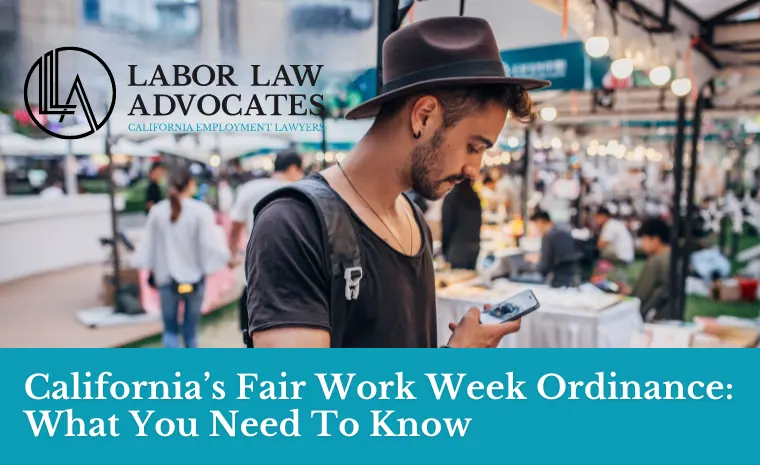California’s Fair Work Week Ordinance: What You Need To Know
The Fair Work Week Ordinance, widely known as predictive scheduling, only applies to retail businesses with over 300 employees worldwide, including those employed through staffing firms and franchisees. This ordinance covers any employee who works for a covered retailer in Los Angeles, California for a minimum of two hours per week in specific geographic boundaries.
The Fair Work Week Ordinance California includes predictive scheduling requirements, such as providing a written work schedule at least 14 days in advance and a good faith estimate of an employee’s work schedule upon request. Employers who fail to comply with the published schedule may trigger predictability pay.
This blog post will help you understand more about the Fair Workweek Ordinance, and how to ensure compliance. Remember, non-compliance with this ordinance is a serious matter and should be avoided. Read on to know more about its benefits, its impact on California workers, and the penalties you might get for non-compliance.
Did your employer violate the law?
Predictive Scheduling Over The Years
Predictive scheduling laws mandate that employers publish schedules in advance and limit the ability to make last-minute changes. Although California has attempted to introduce statewide predictive scheduling laws, none have been successful to date.
Oregon is an exception with a predictive scheduling law applicable to employers in the retail, hospitality, and food industries with over 500 employees globally. Similar laws exist in Washington D.C., Chicago, New York, and Philadelphia, each with different thresholds, scheduling notice requirements, and coverage of retail firms and other industries.
The lack of a statewide law in California has resulted in individual cities implementing their own regulations. Predictive scheduling or fair work week ordinances were first introduced in Northern California for certain businesses in San Francisco, San Jose, Berkeley, and Emeryville. Recently, Southern California also passed the Retail Fair Workweek Ordinance in Los Angeles, which took effect last April 1, 2023.
Employer violated the law? Protect your rights and start advocating for yourself.
Fair Work Week Ordinance in California: What You Need To Know

The purpose of the Fair Workweek Ordinance is to promote better wages and improve working conditions for retail workers, particularly in Los Angeles. The objective is to enhance the well-being, safety, and health of retail workers in the city by offering them a more consistent work schedule that guarantees stability for them and their families, along with opportunities to work more hours.
Good Faith Estimate
Employers must furnish new employees with a written, good-faith estimate of their work schedule before hiring them. The estimate should inform them about their rights or the employer may give them a copy of the required poster under Section 185.11 of the Fair Work Week Ordinance California.
If an employee requests a written time estimate, the good-faith estimate employer must provide it within ten days. However, the estimate is not a binding or contractual offer. If the actual work hours deviate significantly from the estimate, the employer must have a legitimate business reason, which was unknown when the estimate was provided, to justify the deviation and document it properly.
Work Schedule
Employers must give employees notice of their employee schedule at least two weeks or fourteen calendar days before the work period starts. The notice of schedules can be provided by:
- Posting the schedule in a visible location
- Transmitting it through electronic means
- Any other way that ensures actual notice to every employee.
Work Schedule Changes
If there are any employer-initiated schedule changes after the required notice period, the employer must provide written notice to the employee. Under the Fair Workweek Ordinance, an employee or worker has the right to refuse any work location changes, shifts changes, or hours not included in the work schedule.
If an employee agrees to last-minute schedule changes not included in the work schedule, the agreement must be in writing.
Employees are entitled to request their preferred hours, times, or work locations. Retail employers can either accept or reject such schedule requests, but if denied, they must provide a written explanation to the employee for the denial.
Additional Hours For Current Employees
California’s Fair Work Week Ordinance mandates that employers offer additional work hours and shifts to current employees before hiring new ones, including contractors and temporary services staff. Employers must post an advance notice of available or open shifts at least 72 hours before hiring a new person, and existing employees have 48 hours to accept the offer.
Only if no current employees are qualified, none volunteer, or if current staff taking on extra work would necessitate payment of overtime or premium pay, can employers hire new people to meet the increased demand.
Premium Pay for Work Schedule Change
Employers must provide predictability pay in the event of an unforeseeable work schedule change.
If an employee agrees to a change in their work schedule that results in no loss of time or additional work time exceeding 15 minutes, the employer must compensate the employee in writing with one additional hour of pay at their regular rate for each changed scheduled date, time, or location.
In the event that an employer reduces an employee’s scheduled work time by at least 15 minutes, the employer is required to provide compensation to the employee for the time not worked. The compensation must be at one-half of the employee’s regular rate of pay.
Exemptions from predictability pay include: last-minute schedule changes initiated by the employee, minor deviations due to absent employees with employee consent, reduction in work hours due to policy violation, and unforeseen circumstances beyond the employer’s control.
Rest Between Shifts
To promote employees’ well-being and avoid burnout, the Fair Work Week Ordinance California includes a rest between shift clauses.
An employer must seek written permission from an employee before assigning a shift that begins within ten hours of their previous shift. If the employee agrees, the employer must pay them a premium of time and a half for each shift that doesn’t have ten hours of rest in between.
Ordinance Enforcement, Violations, and Investigation
Anyone can report a suspected violation in accordance with the Fair Workweek Ordinance. The name and other identifying information of the reporting person will be kept confidential to encourage reporting. However, the name and identifying information of the reporting person may be disclosed as needed for enforcement purposes or other appropriate reasons.
Benefits of Fair Work Week Ordinance
The Fair Work Week Ordinance of California is a policy that requires employers to provide their employees with stable and predictable schedules. This policy has several benefits for both employees and employers, including:
- Improved work-life balance for employees: The Fair Workweek Ordinance ensures that employees have a predictable and stable work schedule, which allows them to plan their personal lives around their work hours. Having a work-life balance gives the perception of having a family-friendly workplace, which can improve overall well-being and reduce stress and burnout.
- Reduced stress and anxiety for employees: When employees have a predictable and stable work schedule, they are less likely to experience stress and anxiety related to work. This can improve their mental health and well-being, which can lead to improved job performance and productivity.
- Increased productivity and job satisfaction: When employees have a predictable and stable work schedule, they are more likely to be satisfied with their job and have higher levels of productivity. This can lead to improved business outcomes and increased profitability for employers.
- Improved retention rates for employers: The implementation of predictive scheduling can assist employers in keeping their workforce intact through the provision of a consistent and foreseeable work schedule. When employees feel valued and supported, they are more likely to stay with their current employer, thus reducing turnover and associated costs.
Impact on Part-Time and Hourly Workers in California
The Fair Workweek Ordinance is in place to address the issue of underemployment among part-time and hourly employees. Many of these retail workers are assigned flexible schedules and are paid on an hourly or daily basis. They desire more hours, but when demand for work increases, some employers choose to hire additional part-time or temporary workers instead of offering the extra hours to their existing staff.
These old scheduling practices are prevalent among large retailers who operate 24-hour shopping windows, which require more workers to keep up with demand. According to a study by UCLA, 8 out of 10 retail workers do not have a definitive work schedule, while some want more hours, with most of them wishing to work forty hours or more per week.
The Fair Work Week Ordinance aims to ensure that these workers are given fair opportunities for work and are not left underemployed due to the hiring practices of their employers.
Fair Work Week Ordinance: FAQs
What are the penalties for non-compliance with the Fair Workweek ordinance?
The Fair Workweek ordinance imposes penalties for violations, including the payment of minimum wages and sick time benefits unlawfully withheld. It also imposes penalties of up to $120 per employee per day and attorneys’ fees for prevailing employees. Employers may also face a one-time penalty of up to $500 per violation of each section of the ordinance.
Additionally, a retail business may be fined up to $50 per day by the city for unlawfully withholding wages, predictability pay, or sick time benefits. It is possible to impose administrative fines of up to $500 per violation. However, these penalties do not apply to violations that occur within the first 180 days of the ordinances’ effective date, during which employers may receive only written warnings.
What can employees do if they believe their employer is not complying with the Fair Workweek Laws?
If someone suspects a violation of law, particularly the Fair Work Week Ordinance, or related wage and hour regulations, they can report it to the Office of Wage Standards of the Bureau of Contract Administration within the Department of Public Works.
The same government division is responsible for investigating potential violations of the Los Angeles Minimum Wage, Sick Time Benefits, Fair Work Week Ordinance, and related regulations by employers or individuals. Employers must fully cooperate with their investigations.
The employee may look for an employment lawyer with extensive experience in handling cases involving labor law violations, including the Fair Work Week Ordinance. It is best to speak with one and seek proper legal advice on the situation.
Call California’s Award-Winning Employment Lawyer!
If you are an employee who is concerned about your rights under the Fair Work Week Ordinance or you feel you are working in a hostile working environment, seek consultation from California’s best employment attorney.
Labor Law Advocates has award-winning employment attorneys specializing in labor law and personal injury cases. Speak with one of our experts for a free consultation and to learn more about your legal rights and options. Call us at (424)-688-3632 for a free consultation! We are available 24/7.




